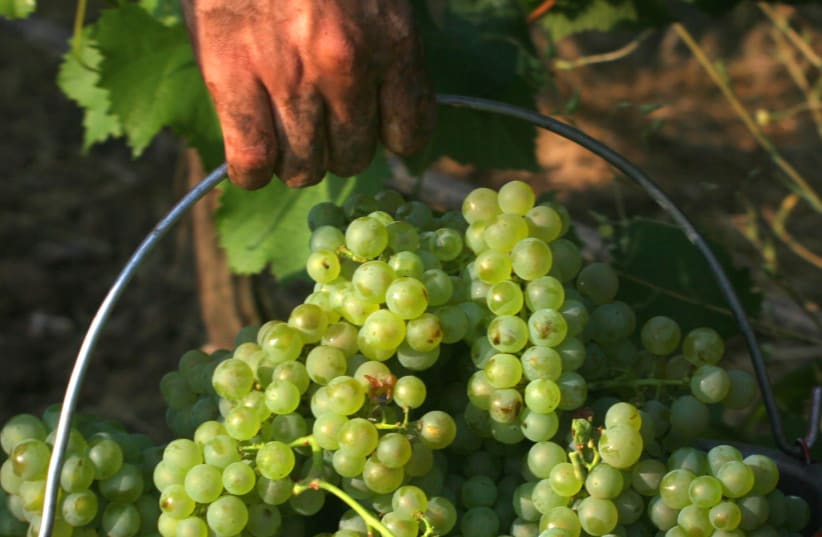Given the scary coronavirus news and the depressing lockdowns, and the even more depressing coalition politics, readers have encouraged me to write something uplifting for this end-of-Passover weekend. I choose to focus on Israel’s wine wonders. (Some say, in jest, that drinking good red wine slows the spread of the virus).
Consider the following amazing fact. Only 150 years after Zeev Teperberg’s first harvest in 1870, and 130 years after Baron Edmond de Rothschild’s first harvest in 1890, Israel has become an internationally acclaimed wine center.
Over the past 10 years, Carmel, Castel, Golan, Teperberg, Tzora and Yatir have garnered global awards for their wines. Other standouts are Gvaot, Psagot, Shiloh and Tura in Samaria; Drimia, Five Stones, Flam, Hayotzer and Oryah in the Judean and Jerusalem mountains; Dadah and Vitkin on the coastal plain; Netofa, Ramot Naftaly, Lueria and Tulip in the Galilee, Bazelet and Matar in the Golan Heights; Midbar in the Negev, and so many more fine wineries.
To me, this is a crystal-clear sign of Divine favor (what Jewish tradition calls a siman muvhak). After 2,000 years of desolation and neglect, the Land of Israel is coming alive and giving forth glorious fruit to its indigenous people! This is nothing less than Biblical prophecy come true: Of such abundance that “Judah shall wash his garments in wine and his clothes in the blood of grapes” and “his eyes will be shot red with wine” (Genesis 49:11).
Indeed, in the time of redemption the mountains of Israel are commanded to “shoot forth your branches and yield your fruit to My People Israel; for they will soon come” (Ezekiel 36:8). The Jewish People is promised that like the days of old, “Judah and Israel (will dwell) safely, every man under his vine and under his fig tree, from Dan to Beersheba” (Kings I 5:5).
Israel’s main strategic advantage in winemaking is the enthusiasm of well-educated young Israeli winemakers who are conversant with the latest grape-growing techniques and winemaking technologies. They experiment with plantings in widely-different terroir – ranging from the volcanic Golan, to the clay and Terra Rossa of Galilee, Judea and Samaria, and the loess sands of the Negev.
This includes veteran Israelis who trained in France, Italy, Australia and California, and winemaking immigrants who brought their professional skills and idiosyncratic styles to Israel.
Unfortunately, the acrid European Union is missing out on much good Israeli wine. Some of the grapes are sourced over the EU-sanctified Green Line, and this makes them forbidden and boycotted “settlement goods.” Perhaps it bothers the EU that there are Biblical and Zionist echoes resonant in every glass of Israeli wine. I think the EU has a bad case of sour grapes.
WHAT FOLLOWS is a roundup of Israeli red wines that I have tasted at winter wine festivals or drank over Passover in our home. These are not the highest-end, most-expensive Israeli wines, but rather are reasonably priced, mid-to-higher-end wines.
Ari Erle’s Bat Shlomo excellent 2018 Betty’s Cuvee blend is round and chewy with a touch of oak.
Eddy Gandler and Dr. Dan Yaniv’s Binnun winery has worked with American consultant Lewis Pasco to produce a powerful 2018 Cabernet-Merlot-Petit Sirah blend.
Eli Ben-Zaken, of the renowned Domaine du Castel winery, has launched a second winery called Razi’el. Its first offering is a 2017 Jerusalem hills blend of Syrah and Carignan. Eli was awarded the Terravino Lifetime Award last year for the individual who has contributed most to the Israeli wine industry.
Elad Movshovitz’s Drimia 2017 Sfar, his flagship Cabernet-Petit Verdot blend with grapes grown in the Yatir forest, is exciting.
Micha Vaadia’s Galil Mountain 2016 Ela blend of Syrah and Barbera is a QPR (quality price ratio) favorite.
Oded Shoham’s Gros 2017 Onyx Cabernet, sourced in the renowned Kadita vineyards, has dark cherry and chocolate aromas.
Philippe Lichtenstein’s Hayotzer 2012 Lyrica is a beautiful Rhone-style GSM (a blend of Grenache-Syrah-Mourvedre).
Menachem Livni and Bruno Darmon’s new La Foret Blanche winery, with grapes sourced in the Hebron hills, offers an outstanding 2017 Cabernet-Shiraz-Merlot blend.
Gidi Sayada’s Lueria 2017 Cabernet-Merlot Special Edition is a QPR steal.
Tal Pelter’s Matar 2017 Nimbus (a Shiraz-Petit Verdot blend) is well-crafted.
Yaakov Berg’s Psagot 2018 Malbec is aromatic, deep and spicy.
Itzik Cohen’s Ramot Naftaly offers a very powerful 2018 Malbec, aged in a 500-liter oak foeder; and a unique 2017 Barbera.
Amichai Lurie’s Shilo 2017 Secret Reserve Petite Syrah is bold and satisfying.
Shiki Rauchberger’s Teperberg 2017 Inspire Malbec-Marselan is an elegant and smooth wine.
Erez Ben-Saadon’s Tura 2016 Mountain Heights Merlot is super-spicy delicious.
Eran Pick’s Tzora 2018 Judean Hills blend (Cabernet-Syrah-Petit Verdot-Merlot) is a masterpiece of controlled craftsmanship.
Paul Dubb’s Tzuba 2016 Terasa is a superb Cabernet-Syrah blend.
The best (and most expensive) wine I drank this holiday (at the Passover Seder, in honor of the birth of a granddaughter on the eve of the holiday), undoubtedly was Golan Flam’s flagship wine, the Flam 2012 Noble. It showcases the stunning terroir of the Judean Hills and Upper Galilee, giving a wine that is complex yet restrained, rich yet soft, long and intense.
Remember that Jewish law mandates a special blessing after drinking Israeli wine: al haaretz ve-al pri gafna: “Blessed is the Lord who gives us the Land of Israel and the fruit of its vines.”
The writer is vice president of the Jerusalem Institute for Strategy and Security, jiss.org.il. His personal site is davidmweinberg.com. He drinks and rates quality kosher wine wherever it is offered.
